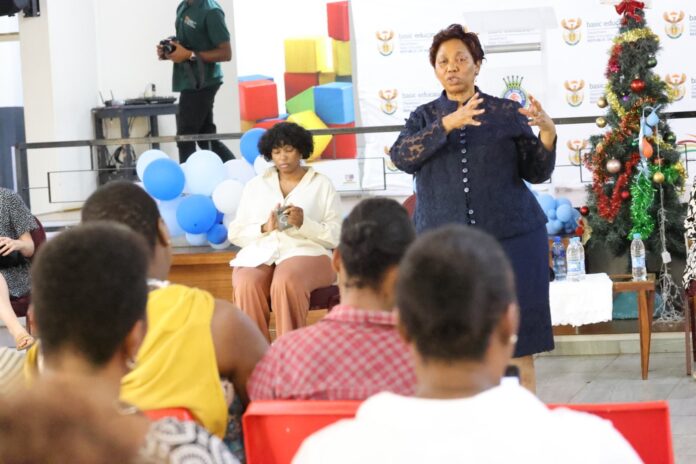INSIDE EDUCATION REPORTER
THE direction to be considered in transforming the landscape of education in Africa, especially the need for innovative strategies such as integrating technology into education and revising curricula, is imperative said the Minister of Basic Education, Angie Motshekga, when sharing her insights at a high-level conference on decolonisation in Johannesburg.
“These strategies can help bridge gaps exposed by recent crises and align with broader Sustainable Development Goals. It is a call to action to rethink and restructure educational frameworks in an equitable, inclusive and forward-thinking manner. By standing together and
pooling our resources and expertise, we can recover from current setbacks and build stronger, more enduring educational foundations for future generations in Africa,” she said.
Motshekga added that the journey towards building resilient education systems begins with a focus on Early Childhood Education (ECE). “According to the United Nations Children’s Fund (UNICEF), investing in Early Childhood Development (ECD) is highly efficient and effective for achieving equitable, sustainable growth,” she said.
Motshekga was speaking at the 10th Education International Africa Regional (EIRAF) Conference held at the Sandton Convention Centre in Johannesburg last month.
The Conference, which is a platform for the South African Government to share recent developments in the Basic Education Sector, as well as future plans around education reform, was attended by President Cyril Ramaphosa, accompanied by Basic Education Deputy Minister, Dr
Reginah Mhaule, with delegates from across the African continent.
Also present were Gauteng MEC for Education, Matome Chiloane; Executive Mayor of Johannesburg, Cllr Kabelo Gwamanda; Education International President, Susan Hopgood; Education International General-Secretary, Dr David Edwards; Education International African
Region Chairperson, Dr Christian Addai-Poku; Education International Africa Director, Dr Dennis Sinyolo; the President of the South African Democratic Teacher Union (SADTU), Magope Maphila; and SADTU General-Secretary, Mungwena Maluleka.
During the Conference, participants were afforded an opportunity to share common goals in terms of transforming and strengthening education systems in Africa under the theme, “Standing Together for Resilient Education Systems in Times of Crisis”.
Deputy Minister Mhaule stated that education systems should be robust enough to maintain continuity of learning in the face of adversity, yet sufficiently agile to evolve in response to new challenges and opportunities.
“This balance between steadfastness and adaptability is crucial in ensuring that our education systems can survive and thrive in times of crises.
In our deliberations, we must factor the educational aspirations that are articulated as guiding pillars of UNESCO’s Sustainable Development Goals (SDGs) 2030; as well as the African Union’s Continental Education Strategy for Africa, 2016-2025. These two frameworks are intended to reorient education systems of the world to meet the knowledge; competencies; skills; innovations; and creativity for a changing world, whilst promoting sustainable development.”
In his address, President Ramaphosa said that the decolonisation of education on the African continent has been long overdue. “The discussions at this Conference, focusing on tackling racism; decolonising education and promoting democracy; human rights; and trade union rights, are vital. We must challenge colonial theories and practices to build resilient education systems that are centred on African perspectives and experiences.
This requires a shift away from a Eurocentric worldview to embrace a more diverse and inclusive perspective. We must acknowledge and value the knowledge systems of all people and integrate them into our curricula and knowledge selection processes. The responsibility to nurture and defend the right to education extends to all spheres of society.”
President Ramaphosa considers education as the cornerstone upon which societies build their future. “Through education, we cultivate respect for human rights, the rule of law and the principles of democracy. As the work of the UN High-Level Panel on the Teaching Profession demonstrates, the adaptation of education systems to a rapidly changing world is one of the most important tasks facing us. This panel draws expertise from diverse stakeholders, including
ministers of education; labour representatives; teacher unions; and civil society organisations. It underscores the importance of educators’ voices in finding solutions to educational challenges.”
The President added that educators play a fundamental and irreplaceable role in shaping societies, and their insights are invaluable in the quest for sustainable solutions. Curriculum reform that responds to the changing world of work is another vital task.
“In South Africa, we are on the brink of significant educational reform with the implementation of the Coding and Robotics curriculum from Grade R to Grade 9. This initiative is part of our broader strategy to integrate STEM subjects into our education system. By doing so, we aim to equip our learners with the digital skills necessary to thrive in a fast-paced world. Labour movements, civil society organisations and non-governmental organisations in the educational sphere must collaborate to protect this critical space. Through such partnerships, we can prepare our learners to be active, informed citizens in democratic societies. The role of organisations such as Education International are vital. As advocates for quality education, your mission is to ensure inclusive and equitable learning opportunities for all,” concluded the President.
INSIDE EDUCATION






